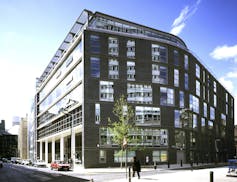A Call to Decolonize Business Schools

We are currently facing a set of overlapping crises in North America, including climate crises, crises of racial and social injustice and of course the COVID-19 pandemic.
Those of us in the world’s richer countries bear much responsibility for this moment, having for too long consumed more than our share of resources, produced more than our share of waste and created and perpetuated social systems rooted in inequality and injustice.
Until now, we have failed to heed the many warnings that our status quo is unsustainable. If there is a silver lining to our current challenges, it’s that we now have an opportunity to reflect on our mistakes and create a better future.
Business schools and the scholars within them also have fingerprints on many of these crises. They’re both a tool for, and a product of, shareholder-centric, profit-maximizing and extractionist economics.
What kind of society?
As we contemplate the future of the business school, we must decide what kind of society we want our students to create and what reforms are needed to enable them to do so.

A recent example comes from one of the world’s leading business educational institutions, the City, University of London’s Business School. The school’s leadership decided to change its name from the Cass Business School to remove the connection to Sir John Cass, who was a major figure in the 17th-century Atlantic slave trade.
Name changes like this can be symbolic but crucial.
It’s true a name change is only an early step in the long journey towards decolonization. As Adam Gaudry, associate professor in the faculty of native studies at the University of Alberta, and Danielle Lorenz, PhD candidate in the department of educational policy studies at the University of Alberta noted in 2018, these efforts must not only involve including more Indigenous people in existing structures. They must also lead to the institution being “fundamentally transformed by deep engagement with Indigenous peoples, Indigenous intellectuals and Indigenous knowledge systems for all who attend.”
Nevertheless, symbolism has always been an important tool to catalyze social action and institutional reform. Name changes provoke opposition, whether for prosaic reasons such as loss of hard-earned brand equity, ideological disagreement or general conservatism.
The example of the former Cass Business School is no exception, with some alumni demanding tuition refunds because of the name change.

‘Cultures of racism’
Today, many business school students intuitively feel cultures of racism in day-to-day conversations and implicit expectations of behaviour and conduct in the classroom, as highlighted in a recent Globe and Mail report.
Institutional legacies and classroom cultures are deeply interconnected, but what makes it particularly toxic for some students is how institutionalized racism isolates marginalized and silenced people over the course of their studies. As ethical and influential educators, we tell our students and our peers what’s important to us. Through signalling and symbolism, we tell the public what we believe in and how value is measured. With our public statements and actions, we define who we are.
Yet symbolic actions also raise awareness beyond special interest groups and launch meaningful conversations into the mainstream.
Drawing parallels with the recent toppling of statues honoring discredited historical figures — whether Canadian prime ministers, Confederate generals in the United States or slave traders in the United Kingdom. In each case, opponents argued that removing the monuments represented an attempt to rewrite or erase history.
However, for those seeking their removal, the statues spoke more to the values of the society that created them than the history that they stood for, which raises the question: Why publicly honour people who represent ethics of extraction and exploitation?
Removing statues or changing names signals a shift in societal ethics and gestures to more inclusive futures that we can all aspire to.
Call to action
We call for business schools to re-evaluate the symbols we are promoting. Who are we elevating? Which ideologies? Specifically, we ask that business schools do the work to not just Indigenize (add to), but decolonize (unlearn). That means having a serious look at the legacies we uphold.
Many other disciplines have begun that work, while business schools seem unsure about the merits of decolonizing. Even the business schools that have begun this journey seem to be fumbling in the dark, unaware that there is a lighted path ahead of us. We must learn from colleagues in other faculties nationally and globally such as law, native studies, education, social work and health sciences, to name a few.
What does this mean for business schools and society at large? The template has been created, and we recognize that naming and renaming represents an important opportunity to reframe our collective identities.
It also requires us as scholars to climb down from our ivory towers to truly understand the implications of longstanding legacies of inequality experienced on our very doorstep — in our classrooms, hallways and day-to-day operations. There are many statues inside business schools that are long overdue to be toppled.
































































































My three sons, 18, 21 and 24yr, own their own company, HighKey Holdings, with several divisions: e-commerce/social media marketing/ influencer ‘giveaways’/real estate investments]. Oldest quit his marketing degree at U. of Winnipeg after 2 1/2 yrs; Middle child never attended where he was accepted into Asper School of Business at U. of Manitoba; and the youngest never even applied to a University. They are in business for themselves! As my oldest expressed it, “My marketing profs couldn’t even engage me in a conversation when I told them what I was doing [HighKey, e-commerce and social media marketing].” And for myself,… Read more »